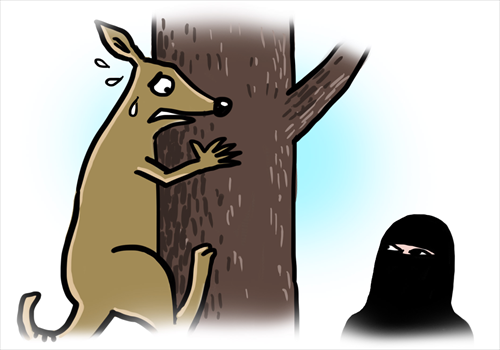Sydney siege shouldn’t be excuse for Islamophobia

Illustration: Liu Rui/GT
I was in Lindt Chocolat Café just a day before the siege happened in Sydney one week ago. The attack sparked fears immediately as it had no specific target - any of us could have been the hostage in the popular Martin Place, where a beautiful Christmas tree was just erected a few weeks ago.
Australia is an immigrant country and has experienced little religious tension in the past. Sydney has seen no such attacks since the bombing incident at the Hilton Hotel in 1978.
The gunman, Man Haron Monis, had recently converted from Shia Islam to Sunni Islam and seemed to want to make some association with the Islamic State group.
But so far, not much is known about what the violent and paranoid Monis was trying to achieve and how exactly some of the hostages died.
Tensions between Muslim Australians and the wider community have escalated in the past few months. Australia's Prime Minister Tony Abbott constantly warned the public that terror attacks would happen to this country while he sent Australian soldiers to Iraq and escalated the level of counter-terrorism operations.
Three months ago, Abbott initiated the biggest anti-terrorism operation in Australia's history. A series of raids in Sydney and Brisbane involving 800 armed police arrested 15 people. All of those operations were based only on "suspicion." However, only two men have been charged in the end. It has increased nervousness within Australia's Muslim community.
According to the 2011 census, only 2.2 percent of the total Australian population are Muslims, but many Australians falsely believe the proportion of Muslims in this country is nine times greater.
As a global city, Sydney is famous for its multiple cultures, and it welcomes all nations. Yet I find many Australians have little interest in learning about cultures from other communities, although they can name a few foreign dishes. Sydney is not a melting pot, but just a display of multiple cultures.
Australian media's Islamophobia does not help Australians understand the Australian Muslim community properly. It hypes the role played by Islam and excludes the vast majority of Australia's Muslim population.
For my master's degree research, I interviewed an Islamic preacher, Mohammed Junaid Thorne, who was described by the Daily Telegraph as "radical" and by Courier-Mail as an "extremist."
I met him in Lakemba, a largely Middle Eastern predominately Muslim community. Lakemba has been depicted by Australian media as the "hotbed of dangerous extremism."
Thorne told me it was rare for journalists to attempt to contact him before their stories were published, and that he had stopped accepting interviews because of preconceived biases.
My experience in Lakemba was good. I met a few friendly Middle Eastern people during filming. They stressed their identity as Australians. I saw their upset faces when they talked about how outsiders misunderstand Lakemba.
When I talked about my experience to some of my Australian friends and Chinese friends, I saw fear and panic in their eyes. They asked me why I did that, making it sound almost as if I had paid a visit to hell. A Chinese girl strongly declined an invitation to watch my footage, as she was worried she would become the target of a terror attack.
Certainly, you cannot hold what is happening in Sydney now against all Muslim people. I am glad to read that Australians banded together on social media to show their support for the Muslim population through the Twitter hashtag "illridewithyou."
It is not a question of whether we should carry out anti-terrorism operations, but of how we carry them out. No choice is easy. One thing is certain: If the government makes a misstep, the people will end up paying the price.
The author worked for the Guardian Beijing office as a researcher and news assistant and is currently studying for a Master of Arts in Journalism in University of Technology, Sydney. huang.cecily@gmail.com